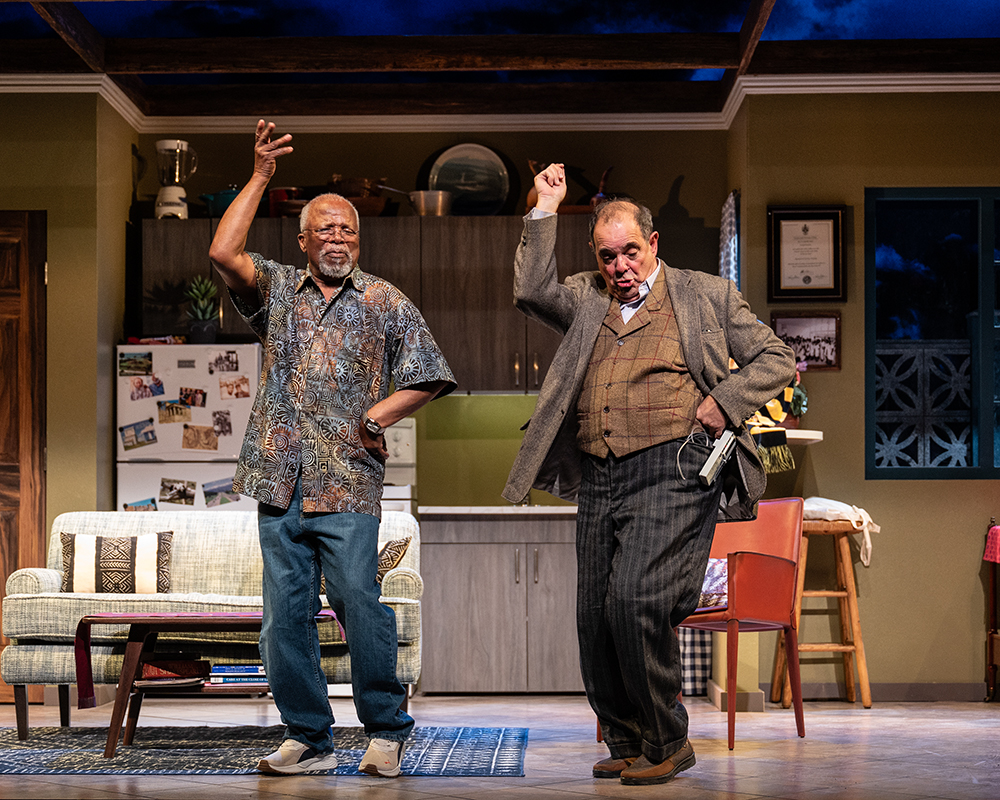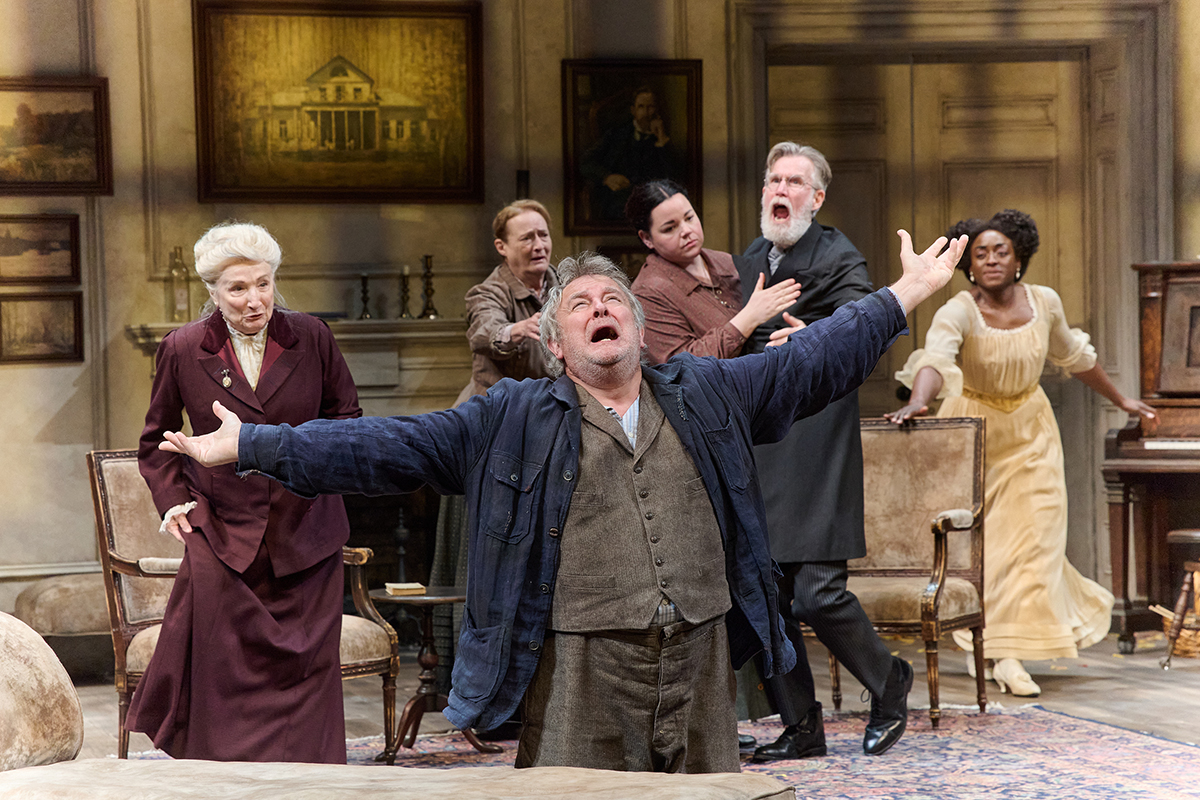Ralph Fiennes and Indira Varma Soar in STC’s ‘Macbeth’ (Review)
The Shakespeare offers an alchemy of cast, style, vision, and a chance to see Ralph Fiennes embody a consummate Macbeth.

In a genius move at the behest of both director Simon Godwin and Ralph Fiennes, the drama of the Shakespeare Theatre Company’s Macbeth starts long before the action. A first view of the production’s Brentwood venue — a giant warehouse with an imposing “M” over its gaping maw and a few huge satellite dishes aimed at the heavens — and you know you’re not in Kansas anymore.
This cleverly portentous vibe continues inside with a vast and gloomy space cut by thick, black draping, and a floor marked by signature projections. Even the (gasp) army of Portaloos manage some mystery behind their billowy shroud. As curtain time nears, a fog rolls into the dimly lit bar, and the trendy cocktail score is replaced by an ominous wartime soundscape heralding the coming concept: a Macbeth set in some parallel universe of the here and now.
The pre-show experience culminates with a walk to the theater through Frankie Bradshaw’s superbly rendered installation of wartime destruction, reminiscent — if a hundred times more artful — of the Imperial War Museum endeavors at Duxford. A cross between an invitation-only rave and the year-end gala of a secret cult, it’s one hell of a way to set a mood.
As clever and delightfully sinister as all this is, a cavernous space has its challenges. Miraculously, director Godwin preserves the acoustics (albeit with some judicious miking) while also managing to bring a sense of intimacy by horse-shoeing the audience around a modest, minimally adorned stage. The effect is of huddling like silent watchers in an endless night, secretly privy to the starkly-lit spaces inside the castle keep.
With a tapestry of sound, light, and carefully chosen music, Godwin evokes time, place, and mood but he is deeply discerning. There may be the aural spectacle of a flyover, a retina-blasting bomb of light, or an electronic drum corp, but so also is there the immense gift of complete silence.
Every Macbeth must find its way into one of Shakespeare’s most tantalizing figures: a seemingly decent man who so quickly becomes murderously intent on his destiny, even as it repulses him into madness.
Here, Godwin prepares the ground with a contemporary approach, a kind of close-hold realism that invites one into a smaller psychological space. Macbeth and his wife may draw down the enormity of their fates, but they are writ with the everyday detail of people you might know.
It is in this context that Fiennes delivers his most extraordinary “why.” With so little of Macbeth’s backstory offered and almost no time to explore motive before the parade of carnage begins, Fiennes builds his Macbeth as he flies him, using every moment and movement to craft testament to this man’s repressed psychic energy.
With masterful subtlety, Fiennes evokes a man whose inner landscape of wants and needs have been held in abeyance by a dam of uncertainty: the heavy, unmoving brow; the hesitant, agitated eyes; hands that are always poised to clutch — be it his wife, a phantom dagger, or a destiny.
When Lady Macbeth spurns an amorous advance, it’s in Macbeth’s small, humiliated smile that we learn so much: for him, this is a small price to pay to live in the sunshine of another’s convictions.
From this place, this Macbeth is ripe for the prophecy’s possession, with Fiennes’ beautifully drawn, self-contorting man a powerful vessel for an internal battle between ambition and the regret and horror it brings. When Banquo’s ghost appears at his dinner table, Macbeth’s parody of jollity and then writhing despair describes a psyche that should have stayed caged — even if it was within an uncomfortable skin.
The immensity is that Fiennes embodies the man with such conversational realism and immediacy while delivering his Shakespeare with a cadence so sublimely modulated and emoted, that it strokes the soul. Remarkably, he leaves no room in his densely preoccupied eyes for the glint of actorly showmanship or the drag of fame. It’s a phenomenal performance.
A fully-conceived Lady Macbeth, Indira Varma is wholly convincing as this powerhouse of a woman, lit with intelligence and a keen eye. She meshes perfectly with Fiennes’ uncertain man, suggesting a marriage in which she has always brought the energy of decision, making her transition from terrifying excitement to horrified reality deeply potent.
If there is no especially physical chemistry with Macbeth, there is a powerful emotional dynamic. When, in the aftermath of their crimes, a shaken Macbeth clutches his fragile wife, they are utterly believable as a couple in crisis.
Another of Godwin’s interesting choices is to make the three witches — presenting rather like homeless extras in a crime drama — more onlookers and occasional mediums than instigators. Lola Shalam’s Third Witch in particular delivers much with her wide, expressive eyes.
As for the broader court and clan, this is, overall, accomplished casting. Ben Allen as Ross does an unusually good job of delivering his terrible news to Macbeth’s soon-to-be nemesis Macduff, while Steffan Rhodri is an able Banquo and Ewan Black a pleasingly unassuming Malcolm. Despite only a few lines, Levi Brown is a singular standout for his presence and facility with the language.
Although a high-energy, driven performance, Ben Turner’s Macduff is just shy of the noble color it needs. This is partly due to Godwin’s choice to somewhat mute Macduff’s pivotal discovery that Macbeth has killed his family.
Matters aren’t helped by an earlier scene of Macduff’s family that feels out-of-step enough to dampen the emotional tenor (and having Rebecca Scroggs resurrect instantly to play the Doctor after being freshly dispatched as Lady Macduff is also an odd choice).
Without more fully realized moments of portent and grief, Macduff’s final denouement with Macbeth may be intense and well-choreographed, but it doesn’t fully sing.
As a whole, the event is an alchemy of cast, style, vision, and a once-in-a-lifetime chance to see Ralph Fiennes embody this consummate Macbeth, a man who truly knows that “all that is within him does condemn itself for being there.”
Macbeth (★★★★★) runs through May 5 at 1301 W St. NE. The run is sold out, but due to cancellations, occasionally small numbers of seats may become available for sale on the STC website. Visit www.shakespearetheatre.org.
TodayTix is offering a limited number of $20 tickets via a lottery for every performance. Visit www.todaytix.com.
Support Metro Weekly’s Journalism
These are challenging times for news organizations. And yet it’s crucial we stay active and provide vital resources and information to both our local readers and the world. So won’t you please take a moment and consider supporting Metro Weekly with a membership? For as little as $5 a month, you can help ensure Metro Weekly magazine and MetroWeekly.com remain free, viable resources as we provide the best, most diverse, culturally-resonant LGBTQ coverage in both the D.C. region and around the world. Memberships come with exclusive perks and discounts, your own personal digital delivery of each week’s magazine (and an archive), access to our Member's Lounge when it launches this fall, and exclusive members-only items like Metro Weekly Membership Mugs and Tote Bags! Check out all our membership levels here and please join us today!
























You must be logged in to post a comment.